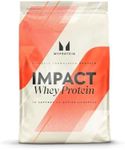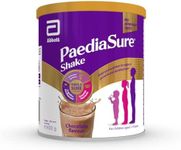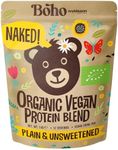Buying Guide for the Best Protein Powders For Kids
Choosing the right protein powder for kids involves understanding their nutritional needs and ensuring the product is safe and suitable for their age. Protein powders can be a helpful supplement for children who need extra protein due to dietary restrictions, picky eating habits, or increased physical activity. However, it's important to consult with a healthcare professional before introducing any supplement to a child's diet. When selecting a protein powder, consider the source of protein, the presence of any allergens, the nutritional content, and the taste and texture, as these factors will influence how well the product fits into your child's diet and lifestyle.Protein SourceThe protein source in a powder is crucial as it determines the nutritional profile and digestibility. Common sources include whey, casein, soy, pea, and rice. Whey and casein are dairy-based and are complete proteins, meaning they contain all essential amino acids. Soy is a plant-based complete protein, while pea and rice are often combined to provide a complete amino acid profile. For children, it's important to choose a protein source that aligns with any dietary restrictions or allergies they may have. If your child is lactose intolerant or follows a vegan diet, plant-based proteins like soy or pea might be more suitable.
Nutritional ContentNutritional content refers to the amount of protein, carbohydrates, fats, vitamins, and minerals in the powder. It's important to ensure the protein powder provides a balanced nutritional profile that complements your child's diet. For kids, a moderate protein content is usually sufficient, as their protein needs are lower than adults. Look for powders that also offer essential vitamins and minerals to support overall growth and development. Avoid products with excessive sugar or artificial additives, as these can be unhealthy for children.
AllergensAllergens are substances that can cause allergic reactions, and it's vital to check for these in protein powders, especially for children with known allergies. Common allergens in protein powders include dairy, soy, and nuts. Always read the ingredient list carefully and choose a product that is free from any allergens your child needs to avoid. Some brands offer hypoallergenic options that are free from common allergens, which can be a safer choice for sensitive children.
Taste and TextureTaste and texture are important factors because they affect whether your child will actually consume the protein powder. Kids can be picky eaters, so finding a flavor they enjoy is crucial. Protein powders come in various flavors like chocolate, vanilla, and strawberry. It's a good idea to start with a small quantity to test if your child likes it. The texture should be smooth and easy to mix with liquids or foods your child already enjoys, such as smoothies or yogurt.
Safety and CertificationSafety and certification ensure that the protein powder is suitable for children and free from harmful substances. Look for products that have been tested for safety and quality by third-party organizations. Certifications like NSF Certified for Sport or USDA Organic can provide additional assurance of the product's safety and quality. Always choose a protein powder that is specifically formulated for children, as adult versions may contain ingredients or dosages that are not appropriate for kids.















